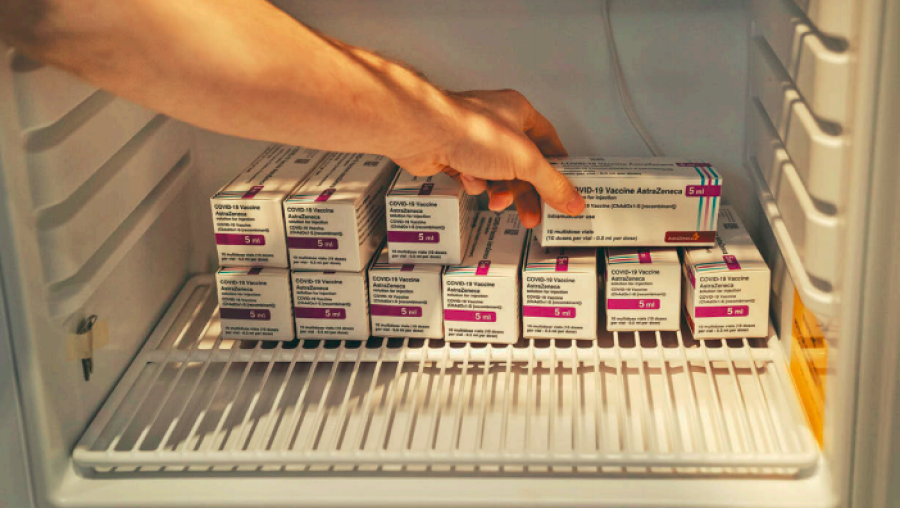Health
As government struggles to procure vaccines, it allows private firms to import them
Public health experts, who say the government should continue its efforts to provide vaccines for free, worry that all will not be able to pay for the anti-Covid-19 shots.
Arjun Poudel
With the government facing challenges to procure sufficient Covid-19 vaccines, the Ministry of Health on Sunday decided to allow private companies to import them.
A meeting of senior officials took the decision to that effect, according to an official at the ministry.
“We have decided to let private companies import Covid-19 vaccines,” the official told the Post asking not to be named. “Those who wish to get the jabs now can get inoculated by paying on their own from private health facilities.”
The government will allow private companies to make a profit of up to 10 percent in each dose, according to officials.
The government has bought two million vaccines so far while another million was donated by India and 348,000 doses have been received from the COVAX facility that is giving low-income countries the vaccine in grants.
The ongoing vaccination drive, which is in its second phase, is being run with the vaccines that the government has procured from different sources, and these jabs are being given for free.
In the second phase that started on March 7, people over 65 years are being inoculated.
With better than expected response in the second phase of immunisation, the government is scampering to procure enough vaccines.
The Health Ministry said that altogether 1,555,411 people have been immunised as of Sunday. In the first phase of the campaign, 438,889 people were administered the jabs and 1,116,522 have been immunised in the second phase.
In the first phase that began on January 27, frontline workers including health workers, sanitation workers, female community health volunteers, security personnel deployed for management of bodies of the people infected with coronavirus, prisoners, and those residing in old age homes were inoculated.
Journalists, staff serving at diplomatic missions, lawmakers, staff members of the federal parliament, staff and elected representatives at the local level and provincial governments were also vaccinated in the first phase.
While the Serum Institute of India is yet to deliver one million of the two million vaccines that the government has paid for, the company is yet to respond to the government’s request to sell the five million vaccines immediately, according to Health Ministry officials.
While the two million doses were bought last month at the rate of $4, the Indian company has said it is unable to sell it at the same price now, officials said on condition of anonymity.
Earlier, the Health Ministry had said that it would not allow private companies to import vaccines until it inoculates 20 percent of the population on its own.
As of Sunday, over five percent of the population has received the first vaccine dose.
Nepal has to inoculate 72 percent of its 30 million people over 14 years of age.
Vaccines from the COVAX facility would cover around 20 percent of the population.
The Health Ministry has estimated that Rs48 billion will be needed to inoculate over 21 million Nepalis.
Public health experts, however, have questioned the decision to allow private companies to import Covid-19 vaccines saying that it is the government that is responsible for saving lives and getting the people immunised against the virus.
“It will be unfortunate if the authorities have decided to involve the private sector and given up their responsibilities,” said Dr Sharad Onta, a public health expert.
Almost all countries in the world have been providing the coronavirus vaccine free of cost, according to Dr Baburam Marasini, former director general of the Department of Health Services.
Allowing private companies to inoculate people could defeat the purpose of mass immunisation, he added.
“Without profit, private companies will not import and if we let them make a profit or charge people, most people will not take the jabs, which means our purpose to control the infection will not be served.”
He also questioned the capacity of private companies to import the vaccine, as most governments across the world have been struggling to secure sufficient doses.
Meanwhile, the Department of Drug Administration on Sunday issued a notice, asking interested manufacturing companies and their authorised importers or sellers to apply to import the vaccines, within seven days with all required documents.
“Companies have to import only those vaccines to which we have given emergency use approval or those that have got emergency use listing from the World Health Organisation,” Santosh KC, spokesperson for the department, told the Post. “Interested companies can include up to 10 percent profit in the vaccine.”
The department has also asked the companies to include estimated projections of the time and doses of vaccine they could import in each lot.
Onta, however, cautiously welcomed the government decision to allow the private sector to import the vaccines.
“It should not be taken negatively if they are only involved in bringing the vaccine to provide early access to those willing to pay for the jabs while the government continues its efforts sincerely to immunise all eligible people,” Onta told the Post.
“We don’t know the real intention behind opening the vaccination programme to the private sector but most of the people will be deprived of getting immunised if they have to pay for the vaccine.”




 21.3°C Kathmandu
21.3°C Kathmandu















